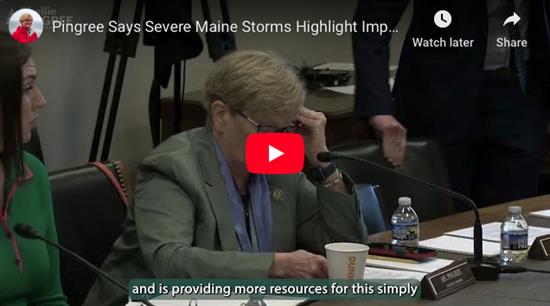Press Releases
VIDEO: In Interior Appropriations Hearing, Ranking Member Pingree Says Severe Maine Storms Highlight Important Need for Forest Service Disaster Funding
Washington,
April 16, 2024
In a House Appropriations Interior, Environment, and Related Agencies Subcommittee budget hearing for the U.S. Forest Service today, Ranking Member Congresswoman Chellie Pingree (D-Maine) called attention to the severe storms Maine has endured in recent months, which have impacted local economies, infrastructure, and forests. “Maine’s logging industry suffered more than $2.6 million in losses from the December storm alone, and has a domino effect on the Maine economy, with larger losses estimated at over $5.5 million. Many of these companies will be unable to file insurance claims because the losses aren’t covered,” Pingree noted in the hearing. Pingree asked U.S. Forest Service Chief Randy Moore how the Forest Service takes impacts of extreme weather events into consideration when managing partners’ forests and related industries. A complete transcript of the exchange is copied below. Click here to watch the full hearing. +++ Pingree: So, the state private and tribal forestry account provides vital financial and technical assistance to nonfederal landowners and resource managers in my home state. The Maine Forest Service has a long history of using these resources to provide services to small woodland owners, loggers, and foresters. But the state and private funding only goes so far. In the last few months, Maine has experienced four major storms that caused widespread water quality issues, washed out roads and bridges, and caused negative impacts to the health of the forests. Maine's logging industry suffered more than $2.6 million in losses for just one of those storms - the December storm alone - and has a domino effect on the Maine economy, with larger losses estimated at over $5.5 million. Many of the companies will be unable to file insurance claims because the losses aren't covered. I've seen some of the devastating pictures of road washouts. And, you know, you know, it's a short season when you can move trees and it's not you know, it's not mud, it's not snowed in. So, it's been a huge problem for them. So how is the Forest Service taking into consideration the impact of this extreme weather we're experiencing on the management of partners, forests and related industry and is providing more resources for this simply a matter of increasing the funding to state private and tribal forestry accounts or are there some other funding possibilities that a partner like the Maine Forest Service could explore? We're just anxious to help them and we want to know what your thoughts are and any resources we should be looking at. Chief Moore: So, Ranking Member, First, let me say that we can and we do request funding through the congressionally required disaster unfunded needs report that's provided. And so, we have received funding there. But to give you an idea of the requests versus the need is pretty significant. We have about $1 billion right now in backlog from request that's needed to respond to many of these disasters across country. And so, the request is one thing. Do we get enough to repair the damage? The answer is no, we don't, but it's helpful. And so, we want you to know how much we appreciate Congress response to our requests. You just said many of these things, more of them are happening, it seems. And whether you believe that is from climate differences, climate change or whatever it may be, it's happening more often. And so the requests are asked more often. And we understand the budget situation. We we fully understand that. But I do want you to know that there's a lot of damage out there. We did receive the 2023 funding requests for prior years, and it still wasn't enough. Like I say, we've got $1 billion backlog of what's needed versus what's been requested. ###
|


